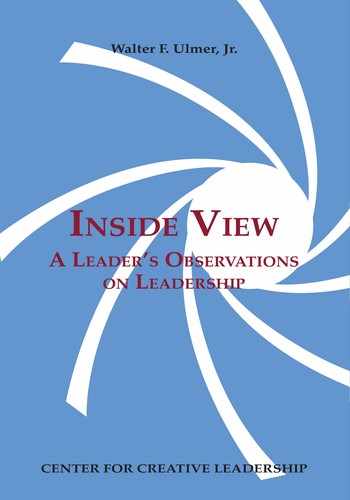Consistent with the title of CCL’s well-known publication, I would like to report on an issue that we at the Center have recently been struggling with and then make an observation about a trend I see in corporate society. I offer these basically as notes and will not attempt to tie the two together.
The Issue of Defining Leadership
We at the Center expend considerable energy thinking and writing about leadership. There is an amazing variety of approaches that one can take to the subject: To what degree are leaders “born,” and to what degree “made”? What are the different kinds of leaders and how do these relate to different situations? How relevant are traits and characteristics to success in leadership? What are the best methods for gaining insights about one’s strengths and weaknesses in leading? How does context affect leadership effectiveness, and vice versa? Are there sets of behaviors and characteristics that can predict an executive’s promotability? Are there aspects of leadership that are culturally determined? Do organizations of different sizes and missions require different kinds of leaders? How, precisely, does a leader learn from experience? How can a leader continue to develop throughout his or her career? How does cognitive ability affect leadership effectiveness? What are the leadership issues involved in diversity—between the sexes, among races, and among age groups? Are public and private-sector leadership different? What role does authority play in the leadership equation? What are the ethical implications of exercising influence over others? How can leadership training be measured and evaluated?
Despite this range of questions, all currently under consideration at the Center, we have never constructed and adopted a single working definition of leadership. Now, however, in the twenty-second year of our history, we have begun an exploration of this perplexing issue. Virtually everyone in the Center has been invited to participate; a few of our colleagues outside the Center have already been asked to accompany us on this journey; and ideas on the subject from the readers of Issues & Observations are welcome.
We are finding this effort stimulating, sometimes even emotional. We encountered a challenge right at the outset, in the form of the question: Can leadership in fact be usefully defined? Also, some of us wondered whether a definition might not tie our hands, limit our options, foster rigidity, or appear presumptuous. Others of us were concerned that the lack of a working definition might suggest a shortage of initiative, integrity, conceptual ability, courage, or teamwork. Yet others had ideas somewhere in the middle.
Nevertheless, we resolved to continue our journey and try to come up with a definition—or perhaps definitions. Our efforts at present focus on exploring the concept of leadership—although we have considered other paths that would lead to definitions of “leaders,” “effective leaders,” “ethical leaders,” and “creative leaders.” We may still get to these. In any case, we are now hard at work with basic concepts, contrasting paradigms, probably some fondly held biases, uncomfortable new formulations, and clearly outrageous propositions. It remains a difficult journey. But I think everyone agrees now that it is one worth making.
An Observation About Quick-change, Quick-fix Leadership
In times of crisis—political, military, or commercial—we know it’s not uncommon to reach out for new leadership. As they say, “When the going gets tough, get somebody tough to shape up the organization.” The new person takes charge quickly, makes hard decisions immediately, throws out the deadwood, cuts red tape, flattens the organization (in more ways than one!), sells off a business or two, and fires a whole bunch of folks. Recently there have been several conspicuous examples of this in some prominent American corporations. Decisive outsiders have arrived to take charge with a style advertised as somewhat more draconian than nurturing.
Instances of the spectacular displacement of top leadership probably will be with us forever. Certainly, the Center’s studies confirm that the derailment of executives is an all-too-common occurrence. Yet the recently advertised episodes, wherein major corporate leadership is cast aside and replaced with heavy-handed quick-fixers, deserve serious review. In any such review I believe that we will raise some familiar questions: Can’t we select and develop senior leaders with the ability to stay in touch with both internal and external realities—including those almost silent incremental changes that accumulate and suddenly explode to destroy the status quo? Can’t a top executive retain options for making significant organizational changes, if events warrant, while still adhering to principles of leadership that build truly effective, cohesive, learning organizations over time?
One possible answer to these questions, of course, is “no.” Perhaps even our best people in top positions cannot control or influence or anticipate sufficiently to prevent organizational disasters. Maybe sudden changes at the helm are an inherent part of business life. But if we were smarter … maybe not!
[Originally published in Issues & Observations, Vol. 12, No. 2, 1992]
